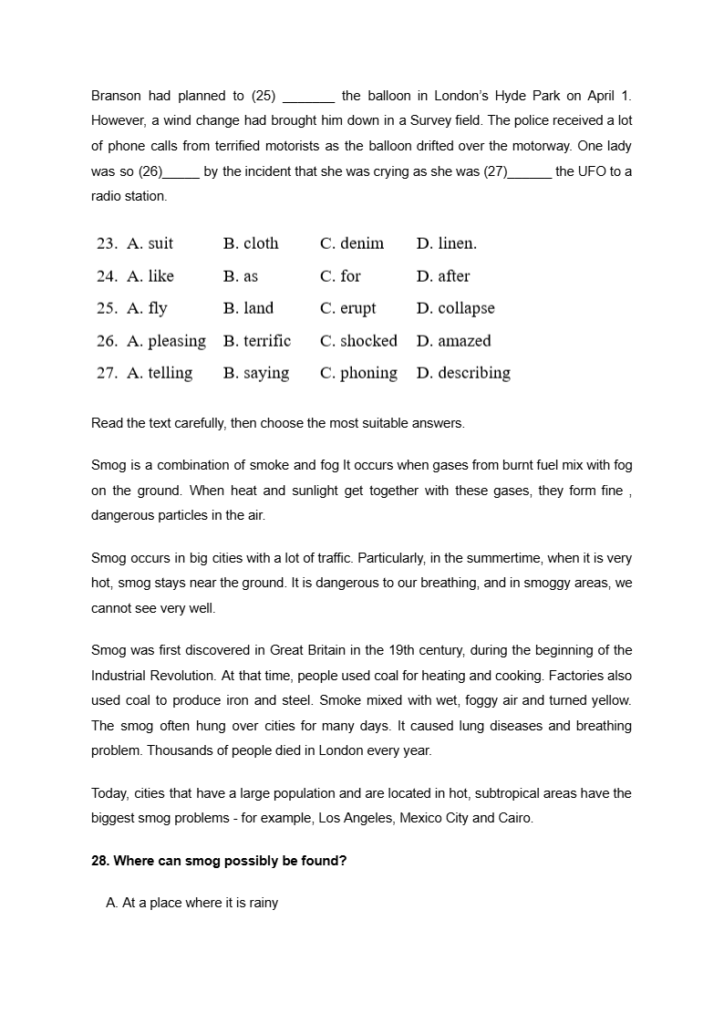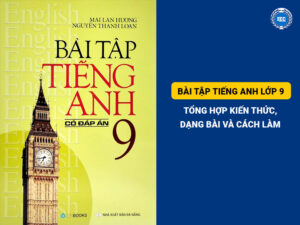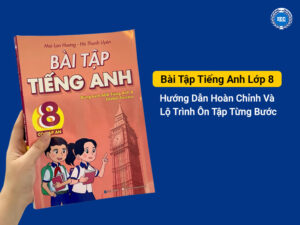Đề Thi Tuyển Sinh Môn Tiếng Anh: Chiến Lược Ôn Thi và Các Lưu Ý Quan Trọng
Kỳ thi tuyển sinh vào các trường đại học, cao đẳng là một trong những sự kiện quan trọng trong cuộc đời học sinh. Trong đó, môn Tiếng Anh luôn là một phần không thể thiếu và đóng vai trò quan trọng trong việc xét tuyển vào các trường đại học, đặc biệt là các trường quốc tế. Tuy nhiên, môn Tiếng Anh cũng là một thử thách lớn đối với nhiều thí sinh vì yêu cầu kiểm tra các kỹ năng nghe, nói, đọc, viết, cùng kiến thức ngữ pháp và từ vựng phong phú. Để giúp các bạn học sinh có sự chuẩn bị tốt nhất cho kỳ thi tuyển sinh môn Tiếng Anh, bài viết này sẽ cung cấp một số Đề Thi Tuyển Sinh Môn Tiếng Anh và cái nhìn chi tiết về cấu trúc đề thi, các chiến lược ôn thi hiệu quả và những lưu ý quan trọng giúp bạn đạt kết quả cao trong kỳ thi.
Nội dung bài viết
Toggle
Cấu Trúc Đề Thi Tuyển Sinh Môn Tiếng Anh
Đề thi tuyển sinh môn Tiếng Anh thường được thiết kế để kiểm tra toàn diện các kỹ năng ngôn ngữ của thí sinh. Đề thi gồm hai phần chính: Phần Trắc Nghiệm và Phần Tự Luận. Mỗi phần có yêu cầu và dạng bài riêng biệt, đòi hỏi thí sinh phải có sự chuẩn bị kỹ lưỡng ở nhiều kỹ năng khác nhau.

Phần I: Trắc Nghiệm (50-60 Câu Hỏi)
Phần trắc nghiệm chiếm phần lớn trong cấu trúc đề thi và thường bao gồm các câu hỏi sau:
- Câu hỏi từ vựng: Đây là phần kiểm tra khả năng sử dụng từ vựng của thí sinh trong ngữ cảnh cụ thể. Các câu hỏi có thể yêu cầu thí sinh điền từ vào chỗ trống, tìm từ đồng nghĩa, trái nghĩa, hoặc lựa chọn từ thích hợp để hoàn thành câu.
- Câu hỏi ngữ pháp: Phần này kiểm tra sự hiểu biết và áp dụng ngữ pháp tiếng Anh của thí sinh. Bạn sẽ gặp các câu hỏi về các thì (hiện tại đơn, quá khứ đơn, hiện tại hoàn thành, v.v.), câu điều kiện, câu bị động, mệnh đề quan hệ, và các lỗi ngữ pháp khác. Đây là phần giúp đánh giá kiến thức ngữ pháp cơ bản và nâng cao của thí sinh.
- Đọc hiểu: Phần đọc hiểu yêu cầu thí sinh đọc một đoạn văn hoặc bài viết và trả lời các câu hỏi liên quan. Các câu hỏi có thể yêu cầu bạn xác định thông tin chi tiết, rút ra ý chính, suy luận hoặc phân tích thông điệp trong văn bản. Việc làm quen với các dạng bài đọc hiểu và cải thiện khả năng nhận diện thông tin quan trọng trong văn bản là rất cần thiết.
- Nghe hiểu: Một phần của đề thi có thể bao gồm các bài nghe, trong đó thí sinh nghe một đoạn hội thoại hoặc bài nói và trả lời các câu hỏi liên quan đến nội dung nghe. Phần này kiểm tra khả năng nghe hiểu của thí sinh, bao gồm khả năng nhận diện thông tin chính, các chi tiết trong bài nghe và khả năng hiểu các ý tưởng được trình bày trong ngữ cảnh giao tiếp.
Xem thêm:
- Sự Khác Biệt Giữa Số Thứ Tự Và Số Đếm Trong Tiếng Anh – Hướng Dẫn Đọc Và Viết Chính Xác Nhất
- Top 10 Chứng Chỉ Tiếng Anh Phổ Biến Và Được Công Nhận Tại Việt Nam
- Các Tính Từ Trong Tiếng Anh (Adjective): Cách Nhận Biết và Cách Dùng Chi Tiết Nhất
Phần II: Viết (Tự Luận)
Phần viết trong đề thi tuyển sinh môn Tiếng Anh yêu cầu thí sinh viết một bài luận với độ dài khoảng 150-250 từ về một chủ đề cụ thể. Các chủ đề thường xoay quanh các vấn đề xã hội, cảm xúc, văn hóa, quan điểm cá nhân hoặc các vấn đề thời sự. Phần viết giúp thí sinh thể hiện khả năng diễn đạt ý tưởng một cách mạch lạc và có hệ thống.
Các yếu tố quan trọng khi làm bài viết bao gồm:
- Cấu trúc bài viết rõ ràng: Một bài viết tốt cần có ba phần chính: mở bài, thân bài và kết bài. Mở bài cần giới thiệu về chủ đề bài viết một cách ngắn gọn và rõ ràng. Thân bài phát triển ý chính và lý giải các luận điểm của bạn bằng ví dụ cụ thể, còn kết bài sẽ tóm tắt lại các điểm chính và kết luận vấn đề một cách hợp lý.
- Sử dụng ngữ pháp chính xác: Bài viết cần sử dụng ngữ pháp chính xác và các cấu trúc câu đơn giản, dễ hiểu. Bạn cũng nên tránh các lỗi ngữ pháp cơ bản như sai động từ, sai thì, sai mệnh đề quan hệ, hoặc lỗi trong việc sử dụng giới từ.
- Từ vựng phong phú: Để bài viết trở nên thuyết phục và hấp dẫn, bạn cần sử dụng từ vựng phong phú và linh hoạt. Việc chọn lựa từ vựng phù hợp sẽ giúp bạn thể hiện được ý tưởng của mình một cách sắc nét và rõ ràng.
- Lý luận mạch lạc và logic: Bài viết cần phải có sự liên kết chặt chẽ giữa các câu, các đoạn văn và các ý tưởng. Điều này giúp người đọc dễ dàng hiểu và theo dõi luận điểm của bạn.
Chiến Lược Ôn Thi Môn Tiếng Anh Hiệu Quả
Để đạt kết quả cao trong kỳ thi tuyển sinh môn Tiếng Anh, bạn cần áp dụng một chiến lược ôn thi hợp lý. Dưới đây là những phương pháp giúp bạn ôn tập hiệu quả.

Rèn Luyện Ngữ Pháp Vững Vàng
Ngữ pháp là phần nền tảng của Tiếng Anh và là yếu tố không thể thiếu trong kỳ thi tuyển sinh. Để làm tốt phần ngữ pháp, bạn cần ôn luyện các cấu trúc cơ bản và nâng cao. Bạn nên bắt đầu từ các kiến thức cơ bản như các thì trong tiếng Anh, cấu trúc câu điều kiện, câu bị động, các mệnh đề quan hệ, và các lỗi ngữ pháp thường gặp. Sau đó, hãy làm nhiều bài tập ngữ pháp để củng cố kiến thức và làm quen với các dạng câu hỏi có trong đề thi.
Cải Thiện Kỹ Năng Đọc Hiểu
Đọc hiểu là một kỹ năng quan trọng trong kỳ thi tuyển sinh. Để cải thiện kỹ năng này, bạn cần đọc thường xuyên các bài viết về các chủ đề đa dạng, bao gồm các bài báo, tiểu thuyết, truyện ngắn và các đoạn văn trong sách luyện thi. Khi đọc, bạn cần chú ý đến việc xác định ý chính, các chi tiết quan trọng và khả năng suy luận từ nội dung bài đọc. Đồng thời, hãy luyện tập trả lời các câu hỏi đọc hiểu để cải thiện khả năng làm bài thi.
Luyện Nghe Hiểu Thường Xuyên
Nghe hiểu là một phần quan trọng trong kỳ thi Tiếng Anh. Để rèn luyện kỹ năng này, bạn có thể nghe các bài hát, xem phim hoặc nghe podcast bằng Tiếng Anh. Bằng cách này, bạn sẽ làm quen với các giọng nói khác nhau, các ngữ điệu và tốc độ nói. Ngoài ra, bạn cũng nên luyện tập nghe các bài nghe trong sách luyện thi để cải thiện khả năng phân tích và trả lời câu hỏi từ các đoạn nghe.
Luyện Viết Và Diễn Đạt Ý Tưởng
Luyện viết là một phần không thể thiếu trong quá trình ôn thi. Để luyện viết tốt, bạn cần làm quen với các đề thi và luyện viết bài luận về các chủ đề khác nhau. Hãy chú ý đến cấu trúc bài viết và cách diễn đạt ý tưởng sao cho mạch lạc và hợp lý. Để cải thiện bài viết của mình, bạn có thể nhờ giáo viên hoặc bạn bè sửa bài, chỉ ra các lỗi ngữ pháp và từ vựng cần cải thiện.
Những Lưu Ý Quan Trọng Khi Làm Bài Thi
Khi bước vào kỳ thi, việc giữ bình tĩnh và quản lý thời gian hợp lý là rất quan trọng. Dưới đây là một số lưu ý quan trọng giúp bạn làm bài thi hiệu quả:
- Quản lý thời gian hợp lý: Hãy phân bổ thời gian hợp lý cho mỗi phần trong đề thi. Đừng dành quá nhiều thời gian cho một phần nào đó, vì bạn có thể không kịp làm phần còn lại.
- Đọc kỹ đề thi: Trước khi làm bài, hãy đọc kỹ đề thi để hiểu rõ yêu cầu của từng câu hỏi. Điều này giúp bạn tránh được các sai sót không đáng có trong quá trình làm bài.
- Giữ bình tĩnh: Đừng để cảm giác lo lắng làm ảnh hưởng đến khả năng làm bài của bạn. Hãy thư giãn, bình tĩnh và tập trung vào từng câu hỏi.
- Kiểm tra lại bài làm: Sau khi làm bài xong, hãy dành thời gian kiểm tra lại tất cả các câu trả lời để tránh các lỗi sai sót nhỏ, đặc biệt là trong phần ngữ pháp và từ vựng.
Đề Thi Vào 10 Môn Tiếng Anh Kèm Đáp Án Chi Tiết
Sở Giáo dục và Đào tạo ….
Kỳ thi tuyển sinh vào lớp 10
Đề thi môn: Tiếng Anh
Năm học 2024 – 2025
Thời gian: 120 phút
- MULTIPLE CHOICE
Choose the word whose underlined part pronounced differently from that of the others by circling A, B, C, or D:

Choose the word whose stress pattern is different from the others by circling A, B, C, or D

Circle the underlined word or phrase (A, B, C or D) that needs correcting

- You have to pass the examination…….you want to attend the course.
- if
- or
- in order to
- so
- She suggested…….to music.
- listen
- listening
- to listen
- listened
- Your friends won’t be here for long, …….?
- do they
- won’t they
- would they
- will they
- If yοιι…….do that exercise. I’ll explain it to you.
- can
- could
- can’t
- couldn’t
- This is the house…….Nam was born.
- where
- which
- that
- when
13. If I were you, I……stay here longer.
- didn’t
- can’t
- would
- will
- I wish it……rain so often here.
- doesn’t
- don’t
- didn’t
- did
15. He told me he……leave the city the following day.
- Will have to
- would have to
- has to
- had to
- By learning English, you can get access…..the world’s development.
- with
- into
- to
- for
Mark the letter to indicate the most suitable response.
17″Let me congratulate you on winning the first prize.”- “____________”
- It’s vey good.
- You’re welcome.
- Never mind.
- That’s very kind of you to say so.
- Mai: “ What are you going to do this weekend, Lan?”
– Lan: “ __________ ”
- I don’t feel like going out.
- What a great idea!
- I haven’t planned yet.
- I went to the beach with my dad.
Mark the letter A, B, C, or D on your answer sheet to indicate the word or phrase that is CLOSEST in meaning to the underlined part in each of the following questions.
- You don’t need a computer. You can get by with the typewriter.
- understand
- manage with
- buy
- pass with
20. I fell into the water when I tried to get out of the canoe.
- enter
- start
- climb
- exit
Mark the letter A, B, C, or D on your answer sheet to indicate the word or phrase that is OPPOSITE in meaning to the underlined part in each of the following questions.
- Look at the illustrations of different parts of a computer system.
- together
- similar
- average
- pure
- She was wearing a beautiful dress.
- unsightly
- dirty
- dusty
- bad
Read the passage carefully and choose the best option to fit each space.
Two British policemen were sent to investigate a flying saucer on March 31, 1989, the day before April Fool’s Day. When the policemen arrived at a field in Survey, they saw a small figure wearing a silver space (23)________ walking out of a spacecraft. Immediately the police ran off in the opposite direction. Reports revealed that the alien was in fact a small person, and the flying saucer was a hot air balloon that had been specially built to look (24)________ a UFO by Richard Branson, the 36-year-old chairman of Virgin Records.
Branson had planned to (25) _______ the balloon in London’s Hyde Park on April 1. However, a wind change had brought him down in a Survey field. The police received a lot of phone calls from terrified motorists as the balloon drifted over the motorway. One lady was so (26)_____ by the incident that she was crying as she was (27)______ the UFO to a radio station.

- At a place where it is rainy
- At a place where the traffic is heavy and the weather is foggy
- In a city where many people smoke
- Underground
29. In the first paragraph, the word fine is closest in meaning to
- tiny
- good
- harmful
- shiny
- What will happen if smog stays close to the ground ?
- It will disappear in a shot time
- It will make the sky cleaner.
- It will harm our health and block our sight.
- It will cause many storms.
- What probably caused the smog in Britain at the beginning of the Industrial Revolution?
- There were too many cars in the country.
- The weather there was too foggy.
- People smoke a lot at that time.
- Factories and people used coal as energy.
- In the third paragraph, the word it refers to ______.
- iron
- smog
- steel
- smoke
- WRITING
Rewrite the following sentences beginning as shown, so that the meaning remains the same.
- Apples are usually cheaper than oranges.
Apples are not……………………………….
- That restaurant is so dirty that no one wants to eat there.
It is such……………………………………….
- Tim will be eighteen next week.
It’s Tim’s……………………………………….
- John and Ann didn’t tell the truth.
Neither………………………………………….
Combine these two sentences into a new one using the given words in brackets.
- It was raining heavily outside. We postponed the picnic. (as)
……………………………………………………
- The girl is very beautiful. Her dress is red. (whose)
……………………………………………………
- She learns English well. She plays sports well, too. (not only )
……………………………………………………
- She is intelligent. She can do this exercise by herself. (enough
……………………………………………………
Đáp án
MULTIPLE CHOICE

Đề Thi Vào 10 Tiếng Anh Năm 2025 Kèm Đáp Án
 6. In spite of John came to the show late due to the heavy rain, he could see the main part of the show.
6. In spite of John came to the show late due to the heavy rain, he could see the main part of the show.
- In spite of
- to
- due to
- could see
- Happiness is a most important thing in my life.
- a
- in
- thing
- my
Circle the best option A, B, C or D to complete the sentences:
8. I wish I …… money to help the homeless and poor people.
- have much
- had much
- had any
- don’t have
- Stormy weather prevented the ferry……..the crossing.
- from making
- to make
- with making
- by making
- It isn’t necessary for students……uniforms today.
- wearing
- worn
- to be wearing
- to wear
- My sister studied hard, …….she completed her examination successfully.
- although
- so
- because
- therefore
- When she lived in the countryside, she…….in the river.
- used swim
- used to swimming
- used to swim
- use to swim
- Is that the man………….?
- you lent the money to
- you lend the money
- whom did you lend the money
- whom you lent the money
- Tet is a festival……..occurs in late January or early February.
- who
- whom
- which
- what
15. My teacher suggests….. … lessons to poor children.
- gave
- giving
- having given
- given
- I don’t know how you can put up…….such bad working conditions.
- to
- on
- with
- in
Mark the letter to indicate the most suitable response.
- “How was your trip?” – “_____________”
- Wonderful.
- Thanks. That’s very kind of you.
- That would be great.
- It’s my pleasure.
- “I think we should take a shower instead of a bath to save energy.”
– “_____________”
- Yes, I’d love to.
- Great! Let’s do that.
- Yes, thanks.
- I’m sorry, I can’t.
Mark the letter A, B, C, or D on your answer sheet to indicate the word or phrase that is CLOSEST in meaning to the underlined part in each of the following questions.
- Within their home country, National Red Cross and Red Crescent societies assumed the duties and responsibilities of a national relief society.
- took on
- got off
- went about
- put in
20. She didn’t get along with her two brothers.
- agree with
- hate
- please with
- have a good relationship with
Mark the letter A, B, C, or D on your answer sheet to indicate the word or phrase that is OPPOSITE in meaning to the underlined part in each of the following questions.
- Fill each of the blanks below with a suitable word from the reading passage.
- unimportant
- irrelevant
- uninteresting
- impossible
- Work with a partner and fill in the blanks with the right questions.
- sick
- liberal
- unhealthy
- improper
Read the passage carefully and choose the best option to fit each space.
People who live in the industrially advanced and affluent countries of the world take telecommunication for granted. Computer data with text, graphics and even video clips (15)……been added to the telephone. Fax, e-mail and modems have become integral parts of office equipment for most businesses in the developed world. It is important to remember, however, that although North America, Europe and Japan own about 85 percent of the world’s telephones; they have under a quarter of the world’s population.
Today, telecommunications are at the center of (17)…..international economy. To participate in this economy, countries need telecommunications to enable them to obtain information and knowledge which they can use to attract industrial (19)…..and find new markets. Businesses and factories need the telephone and computer because producers and customers may be thousands of kilometers apart. Regional and national borders are no (20)…..barriers to trade. With the trend towards a more cooperation between countries, global telecommunications increase in importance. They are the key to development and progress.

- The four boys of the Beatles
- came from the same family
- came from a town in the north of England
- were at the same age.
- received good training in music.
- What is not true about the Beatles.
- The members had no training in music.
- They had long stable career.
- They became famous when they wrote their own songs.
- They changed pop music.
- The word “sensational” is closest in meaning to
- notorious
- bad
- shocking
- popular
- The tone of the passage is that of
- admiration
- criticism
- neutral
- sarcasm
- WRITING
Rewrite the following sentences beginning as shown, so that the meaning remains the same.
- The police let him leave after they had questioned him.
He was…………………………………………………………
- I haven’t seen that man here before.
It’s ……………………………………………………………..
- The furniture was so expensive that I didn’t buy it.
The furniture was too………………………………………
- I’m always nervous when I travel by air.
Travelling………………………………………………………
Combine these two sentences into a new one using the given words in brackets.
- She can’t understand me. She is my old acquaintance. (Although)
……………………………………………………
- We are always proud of my dad. He is the best person in the world. (who)
……………………………………………………
- He drove very fast. He had an accident. (because of)
……………………………………………………
- This problem is very difficult. We can’t solve it now. (so)
……………………………………………………
Đáp án
MULTIPLE CHOICE

WRITING
- He was released after he had been questioned by the police.
- It’s the first time I have seen that man here.
- The furniture was too expensive for me to buy.
(or) The furniture was too expensive, so I didn’t buy it.
- Travelling by air always makes me nervous.
- She can’t understand me although she is my old acquaintance.
- We are always proud of my dad, who is the best person in the world.
- Because of driving very fast, He had an accident.
- This problem is very difficult, so we can’t solve it now.
Kết Luận
Môn Tiếng Anh trong kỳ thi tuyển sinh là một môn thi quan trọng và đòi hỏi thí sinh phải có sự chuẩn bị kỹ lưỡng. Với chiến lược ôn tập hiệu quả và sự kiên trì, bạn hoàn toàn có thể đạt được kết quả cao trong kỳ thi. Hãy chú trọng vào việc luyện ngữ pháp, cải thiện kỹ năng nghe, đọc và viết để nâng cao khả năng Tiếng Anh của mình. Chúc các bạn học tốt và thành công trong kỳ thi tuyển sinh sắp tới!
Danh mục bài viết
Bài viết mới nhất
-
 07 Th7 2025Bài Tập Tiếng Anh Lớp 9: Tổng Hợp Kiến Thức, Dạng Bài Và Cách Làm Hiệu Quả
07 Th7 2025Bài Tập Tiếng Anh Lớp 9: Tổng Hợp Kiến Thức, Dạng Bài Và Cách Làm Hiệu Quả -
 07 Th7 2025Từ Vựng Tiếng Anh Lớp 3: Bộ Từ Theo Chủ Đề, Hướng Dẫn Học & Ứng Dụng Thành Công
07 Th7 2025Từ Vựng Tiếng Anh Lớp 3: Bộ Từ Theo Chủ Đề, Hướng Dẫn Học & Ứng Dụng Thành Công -
 07 Th7 2025Từ Vựng Tiếng Anh Lớp 5: Danh Mục Chủ Đề, Phương Pháp Học, Bài Tập Thực Hành và Ứng Dụng Thành Công
07 Th7 2025Từ Vựng Tiếng Anh Lớp 5: Danh Mục Chủ Đề, Phương Pháp Học, Bài Tập Thực Hành và Ứng Dụng Thành Công -
 07 Th7 2025Từ Vựng Tiếng Anh Lớp 7: Tổng Hợp Chủ Đề, Cách Học Hiệu Quả và Ứng Dụng Thực Tế
07 Th7 2025Từ Vựng Tiếng Anh Lớp 7: Tổng Hợp Chủ Đề, Cách Học Hiệu Quả và Ứng Dụng Thực Tế -
 07 Th7 2025Bài Tập Tiếng Anh Lớp 8: Hướng Dẫn Hoàn Chỉnh Và Lộ Trình Ôn Tập Từng Bước
07 Th7 2025Bài Tập Tiếng Anh Lớp 8: Hướng Dẫn Hoàn Chỉnh Và Lộ Trình Ôn Tập Từng Bước


